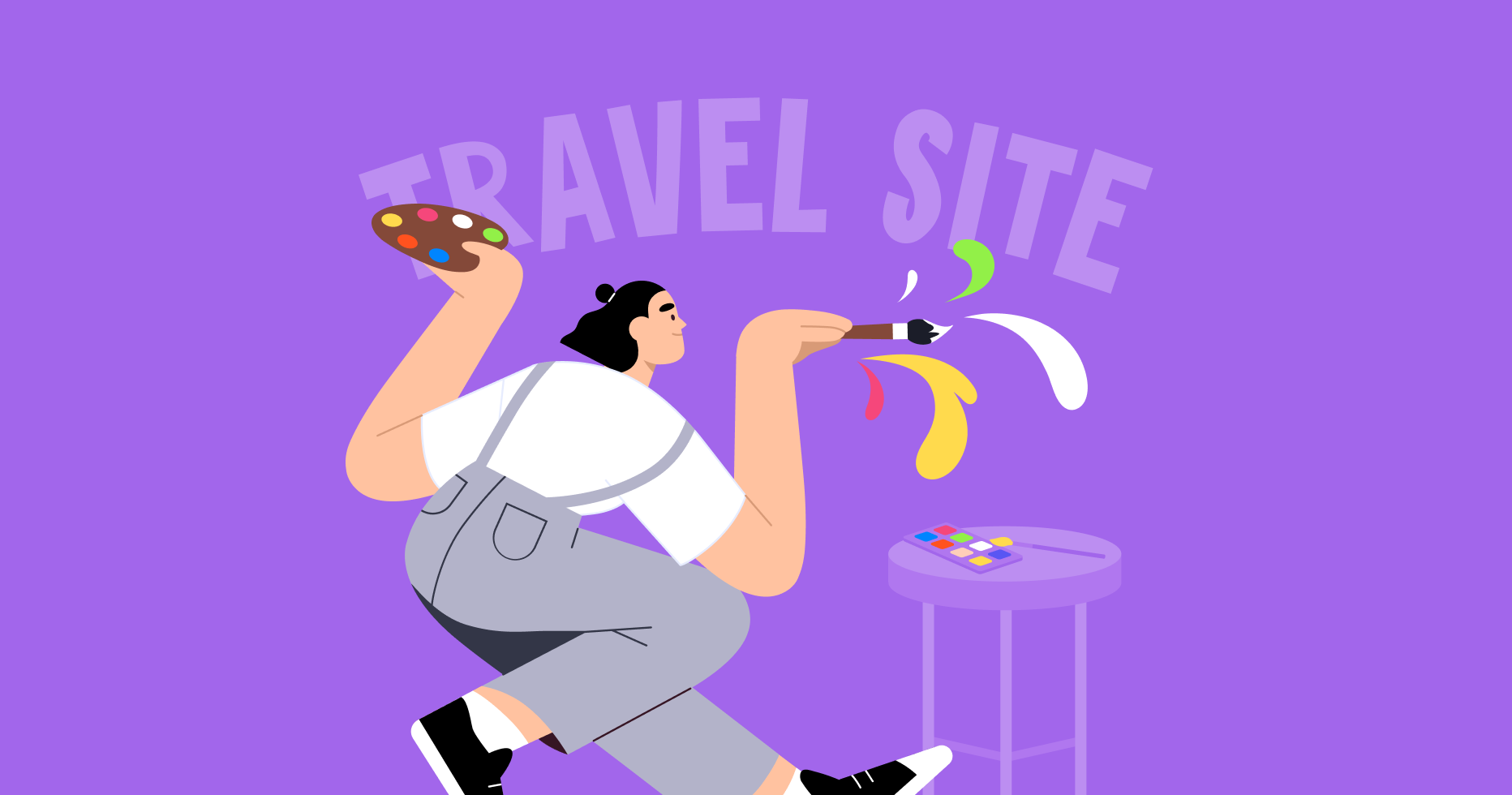How to choose a niche for your travel website
You should very carefully choose a niche for your website and determine ideas for some future articles at the beginning. We’ve already shared an article with 10 of the best travel micro-niches. However, the following tips will help you determine the best ideas for your website.
Traffic and keywords
How to understand which niche will be popular and what will be interesting to your users? The easiest way is to ask the search engine.
For example, you can choose to create a website about bike traveling or motorhome traveling.
Checking how many results Google shows is the first move:


Accordingly, a bike-traveling website will have higher competition. However, at the same time, the huge volume of results is a signal that the niche is popular. For a more accurate and detailed analysis of traffic by keyword, use specialized tools:
- Google Ads Keyword Planner is great for analyzing statistics for specific keywords and estimating the amount of traffic they will generate. To work with the keyword planner, you need to log in using your Google account.
- Google Trends allows you to track the dynamics of search queries, the growing popularity of trends, and make certain forecasts for the future.
Some SEO services show not only current statistics, but also past statistics. This will help you navigate which destinations can be popular after the full opening of international borders. In addition to Google Products, there are many other great alternatives for keyword search.
Keywords will help you understand the popularity of a niche and find competitors. Find five to ten high-frequency queries (for example: budget travel, travel with children, travel in South America, etc.). Enter them into the search engine. Analyze the results on the first page and select sites that are suitable for your topic. It’s better to choose queries found in the SERP for all requests (or for the majority of requests).
Competition
Once you have identified your main competitors by keyword, analyze their websites and ask yourself the following questions:
- What kind of search queries is this site promoting?
- What are the most clickable and most successful ads?
- What other interesting ideas can be found on this website?
Don’t copy everything. In fact, don’t copy at all. Instead, think about how to use this or that feature for your own website. Pay attention to the errors and shortcomings of competitive sites in order to avoid them in your work.
Specialized tools will help you: SimilarWeb, Serpstat, SEMrush, and others.
Passion and knowledge
These are two important keys to the success.
Choose content ideas for your travel blog that you are interested in yourself, as you’ll have to devote a lot of time to working on content. The reader should see that you really love what you’re doing, which will make him/her want to follow you. However, passion alone isn’t enough. When passion is supported by knowledge, the process of attraction and monetization goes faster.
It’s impossible to know where all the bodies are buried. However, it’s extremely beneficial to have basic knowledge about the topic you’re planning to write about. You can find out any gaps in your knowledge along the way or hire authors with the necessary skills and knowledge.
How to find travel blog ideas
Creating interesting and useful content is an integral part of your blog promotion. But what if you don’t know which topic to choose and how to grab the interest of your readers? We offer a list of sources where you can look for inspiration and choose which topics to use for your travel blog.
- Your own experience is the best source of inspiration for creating content. You, as a keen traveler, can convincingly draw attention to places and events in a way that no one else can and talk about them in the first person.
- Search by keywords by using the search engine or special tools.
- Use special tools to generate ideas, such as Portent’s Content Idea Generator or Link Bait Generator. The principle is simple: enter your topic and get sample headlines for your future articles.
- Ask the appropriate community. There are many social networks and websites that are geared toward answering questions and exchanging opinions: Quora, Reddit, Facebook, etc.
What exactly you write about depends on the niche you have chosen, but there are general topics that are always relevant: travel preparation, useful tips about travel methods, attractions, cuisine, events, travel safety, accommodation, etc.
For more travel blog post ideas and topics that will always be interesting to your reader, look in our expert sources.
How to create content
You create content for readers, but don’t forget, if necessary, you can naturally enter keywords into your content that will catch the attention of search engines and serve as calls to action for buyers. The more natural and interesting your articles are, the more readers you’ll attract and accordingly, the more chances you will have to successfully earn money online.
There are two ways to create content for your blog: use the resources of free content available on the Internet (both text and visual) or do it yourself. In order not to make mistakes, when choosing the second path, follow the simple rules below.
We’ve created a free guide on how to create perfect content that will help you learn how to fill your website with first-class content:
Write different types of content
Today’s Internet audience is captious. They quickly grow bored of the same type of content. To keep your audience interested, use as many types of content as you feasibly can. We divided the top types of content into four groups.
| Content Type | What for | Types of Articles |
| Informational | To provide the reader with information. For example, in order to choose which country to travel to with children in November, the reader needs to know about the weather, entertainment options for the whole family, transport features, etc. | How-to articles Reviews Answers to frequently asked questions Workshops Checklists Experiments Selection of useful Resources |
| Selling (Commercial) | To get the reader to take a specific action. Contains a specific proposal and a call to action: “buy” or “order”. This content is frequently orientated on transactional (commercial) keywords. | Case study Promotional mailing Landing page Commercial offers Product reviews |
| Entertaining | To entertain the reader. So that your audience continues to read without getting bored, you need to invite them to relax and have fun from time to time. | “Bad advice” (anti-examples show what not to do) Comics Quotes Riddles and puzzles Jokes Memes Interesting facts Provocative articles |
| Involving | To encourage customers to communicate, leave comments, and share their photos. | Articles on hot topics Opinion articles Interactive content (tests, quizzes, polls, online calculators, animated infographics) Questions and answers Articles about current events |
By combining different content ideas for travel websites, you’ll always keep your readers interested.
When choosing ideas for articles, don’t forget that your site should simultaneously be useful to your audience and generate income for you. Articles sharpened by transactional keywords will help you make sales and, in term, generate more income. However, don’t focus solely on commercial articles. Apply different types of content.
Use keywords
Keywords are words or phrases that users enter in the search bar to locate the information they need.
For instance, to find out which countries have good cycling opportunities, the user should enter the query: “country cycling”. The correct use of keywords in the blog will help you advance in the search results.
In order to search for keywords, analyze competitors and search engine results, brainstorm with colleagues, and use special tools to generate keywords and create a semantic core.
When entering keywords into your content, keep the following rules in mind:
- The text shouldn’t be overloaded with keywords. The optimal amount is 2-5%.
- If you pick many keywords of the same type, you can combine them and add others.
- Use keywords in both headings and subheadings. Insert the query at the beginning of the text (in the first 200 words).
- Write attractive optimized meta tags. They should contain requests and make your site stand out from others.
- Don’t forget about the keyword request in the URL of your page.
Most importantly, remember that you write articles primarily for readers and not for the search engines. Keywords should be as relevant to the topic as possible and all references to requests should be appropriate. The more original the content, the more it will be appreciated.
Add visuals
The successful use of visual content can perfectly complement your textual content and become a final flourish on your website. The most popular visual content options are:
- Photos or Pictures: These elements serve as a clear reinforcement of your words. Beautiful travel photos will increase the credibility of your blog and catchy pictures attract attention. You can use your own photos or various images from online photostocks.
- Videos or Animations: Users like to search for answers to their questions while watching videos. For example, tell your readers about street food in a particular city.
- Infographics: Information in graphical form is easier to read. Make an infographic on how to pack your suitcase correctly or what baggage weight requirements are in popular countries.
Videos positively affect behavior. On average, website visitors spend more time on pages with embedded video. Increased average time spent on each page helps promote your site on search engines.
Structure content properly
The right text structure improves the perception and attractiveness of your site for the reader. In addition, structure is an effective tool for promoting content that is no less important than keywords and uniqueness.
There are many options to structure your content. It all depends on the subject, type, and purpose of the information. However, you can use a universal template when preparing articles.
Title: Unique, concise, informative, and reflective of the essence of the text
A catchy headline can attract the target audience and encourage them to read the material. Sometimes a provocative headline attracts more potential readers. The headline should reflect the topic and not deceive or mislead your audience.
Introductory paragraph: Motivating and convincing
The purpose of the introduction is to catch the reader’s interest. The introductory paragraph should briefly convey the content of the text and convince your reader to continue to the end. To write a successful introduction, you need to accurately present the problems and needs of your audience and reflect them in this paragraph.
The main part: The essence of the text
The main part should fully cover the topic and solve the problem from the introductory paragraph. Express your thoughts in capacious, but meaningful sentences. This is the path to success.
The final part
How should you complete the text? This all depends on the purpose. If the information is commercial, then use a call to action (subscribe, call, order). A universal way to conclude is to summarize the above material.
Don’t forget about the text formatting: break the material into paragraphs (one thought = one paragraph), highlight subheadings, use bold and italics, add numbered and bulleted lists, and add pictures and videos.
Best travel website ideas
Travel is a popular niche, due to its diversity. You can create a personal blog and write about all your trips. You can also create a narrowly targeted website that will talk in detail about one country or region of a country or about travelling around the world on a budget.
You can create a site about one country (for example, the one you live in) or a site where you write about many countries. Each form its own pros and cons, which we discussed at the webinar:
Despite the fact that the travel market is going through hard times due to the coronavirus, creating a travel website is a good idea. Demand is already picking up and a full recovery awaits. Nevertheless, the coronavirus has made changes in the market and set new trends that you can focus on when choosing a topic for your website or preparing materials. For example, the coronavirus outbreak of 2020 has led to an increased demand for domestic travel, thus the domestic markets are a stellar choice.
You can create a website devoted mostly to your readers, where they can share their experiences, opinions, and travel stories as well as make comments.
Here are a few more ideas for your travel website:
- Write about your hometown or place where you live
- Interview travelers or other people connected to tourism
- Report on travel news
- Post travel photos and videos
- Provide clear instructions on different tourism topics
- Describe various legends from places you traveled
- Food blog about a specific country
Finally, you can draw inspiration to create your own travel resource by browsing through other successful travel sites.
Best travel ideas for making money
Choosing a niche for your tourism website isn’t an easy task. However, striking the right balance of the semantic core, passion for your work, knowledge on a chosen topic, and interesting article design will help you succeed. While choosing topics you love, don’t forget to analyze your niche to find the best travel website ideas.





